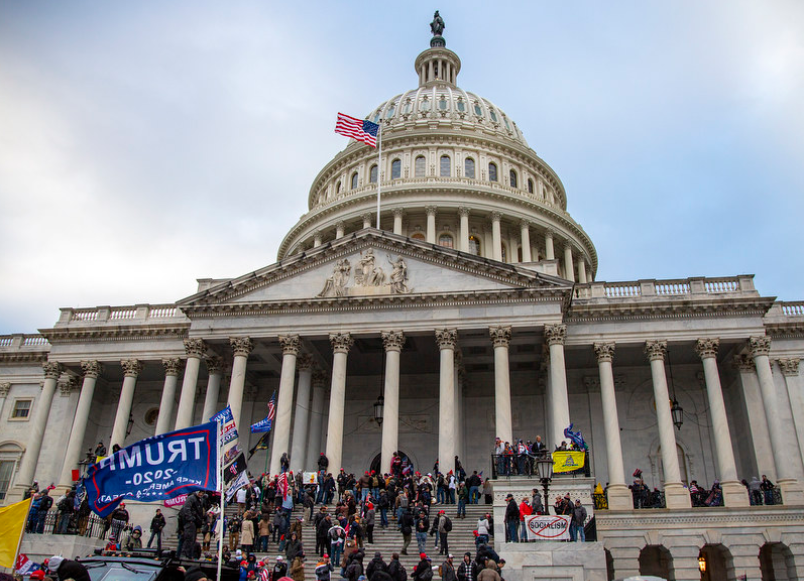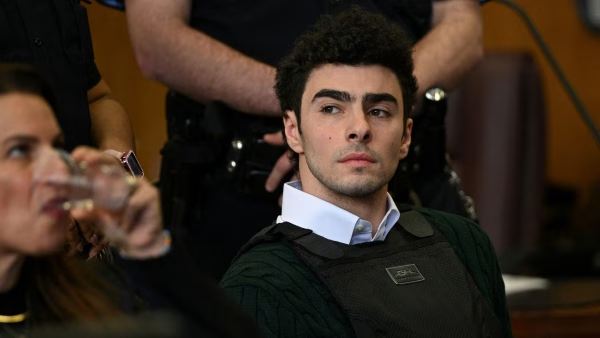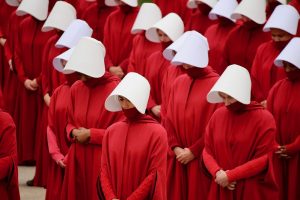Reactions to pro-Trump riot at U.S. Capitol
January 14, 2021
As Congress gathered on Jan. 6 to count the electoral college votes that would certify President-Elect Joe Biden’s victory, a crowd in support of President Trump’s attempts to overturn the results of the 2020 election stormed the U.S. Capitol, forcing Congress into lockdown.
Images from Wednesday depict a crowd gathered among Confederate flags, anti-Semitic messages and signs that read “stop the steal.”
Other videos posted to social media show police officers waving the crowd towards the Capitol after Trump’s “Save America” rally and rioters scaling the walls of the building.
University junior Emily Stettner said, “I think the storming of the U.S. Capitol is domestic terrorism at its core. The Trump flags flying through the shattered windows of this monument perfectly encapsulates the racist foundations of our country.”
Explosive devices were also found near the headquarters of the Republican National Committee and the Democratic National Committee in Washington, as well as on the grounds of the Capitol complex. All three pipe bombs were destroyed by a bomb squad.
Five people were pronounced dead, including a woman who was shot by Capitol Police as rioters forced their way into the House chamber and a Capitol police officer who died from injuries sustained while engaging with the crowd.
Over 100 arrests have been made since the riot, leading many to note how small the number is in comparison to law enforcement’s forceful response to the Black Lives Matter protests over the summer.
“Even more terrifying is the thought of the blood that would have been shed if there hadn’t been white supremacists among the rioters that are backed ideologically by the police force and the president,” said Stettner.
University alumni Sarah Gibney said, “I am both shocked and not shocked by what happened at the Capitol. This has been four years of Trump building up a base that follows him like a cult leader. Although I’m in no way on any kind of alt-right social media platforms, I did see people saying ‘A storm is coming’ or ‘We’re gonna take the Capitol on Jan. 6.’ Trump himself was even tweeting that to his base, so, ultimately, I’m not surprised this occurred.”
“What I am absolutely shocked and horrified by, however, is how unprepared everyone was to deal with it. This felt very purposeful, especially when you compare the Black Lives Matter protests and how heavily militarized the response would be on a moment’s notice,” continued Gibney.
Trump tweeted a now-removed video message on Wednesday afternoon telling his supporters to go home, adding “we love you, you’re very special.”
“It’s upsetting that people are trying to push this off as just ‘Trump’s people’ when this situation has so much to do with racism and white supremacy, especially since the president has become synonymous with the term and has spent so much of his presidency oppressing people of color, especially Black people,” said Gibney.
The message was removed by Twitter and Facebook for violating site policies and resulted in a 12-hour lock for Trump’s account. Facebook and Instagram soon followed suit, announcing Trump would be banned from the platforms indefinitely.
On Jan. 8, Twitter announced it had permanently suspended Trump’s account because of “the risk of further incitement of violence.”
University professor of Women’s and Gender Studies Dr. Pamela Fuentes said, “I could not help but notice the comparisons of what was happening with the history of Global South countries, particularly in Latin America. All of these associations were negative, like if chaos, violence and political instability were restricted to those parts of the world. It is central to understand that the experiences of those countries have been shaped by imperialist powers, including the United States. I am afraid that perceiving attempts to overturn electoral results by force as something ‘foreign’ oversimplifies the intricacies of socio-political movements that have grown and been nurtured in the United States, and complicates accountability.”
“I always recommend to take a look at history to understand the present, and this urgent time is no exception. Knowledge and memory will be crucial tools not only to move forward but also to understand why and how the Capitol attack took place,” Fuentes continued.
Congress returned to the Capitol on Wednesday night to resume the process of certifying the Electoral College results, where Vice President Mike Pence declared Biden and Vice President-elect Kamala Harris the winners.
“Now that Congress has certified the results, a new administration will be inaugurated on January 20th,” Trump said in a speech posted to Twitter once his account was unlocked. “My focus now turns to ensuring a smooth, orderly and seamless transition of power.”
Following the riot, a number of staff members from the Trump Administration announced their resignations, including Betsy DeVos, Secretary of Education; Elaine Chao, Transportation Secretary; Sarah Matthews, White House deputy press secretary; Stephanie Grisham, Chief of Staff and Press Secretary to first lady Melania Trump. U.S. Capitol Police Chief Steven Sund has also resigned.
House Speaker Nancy Pelosi and Senate Minority Leader Chuck Schumer later called on Pence to invoke the 25th Amendment, which would declare Trump unfit for office and lead to his removal, with the vice president taking over as acting president until inauguration day. Pence has since declined.
“Above all, I hope we keep questioning the roots of this episode in the upcoming years, because treating it as an isolated incident, an exception or the result of the actions of a few people or one man in particular, even while they have their fair share of responsibility, may push the structural problems this country needs to solve into the shadows,” said Fuentes.
On Jan. 13, one week after the riot and one week before his term is set to expire, the House of Representatives voted to impeach Trump for the second time on a charge of “incitement of an insurrection.” The trial will most likely not come to a resolution until after Biden has been sworn in.
According to The New York Times, if the Senate decides to convict Trump, a subsequent vote to “bar an official from holding ‘any office of honor, trust or profit under the United States’” can and may take place.












